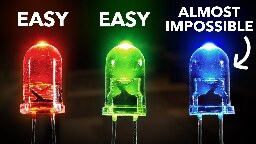Why It Was Almost Impossible to Make the Blue LED


youtu.be
The blue LED was supposed to be impossible—until a young engineer proposed a moonshot idea.
You are viewing a single comment


The blue LED was supposed to be impossible—until a young engineer proposed a moonshot idea.
The blue led was released in 1993. I remember reading an article in Wired magazine (back when magazines were published on paper) about the invention. Gladly, the article is still available online: https://www.wired.com/1995/03/blue-laser/
I talked with some friends about the “true boo-roo” led, and the phrase stuck with us (that’s why I still remember the article). At the time (almost 30 years ago) we had no idea how important the invention was, even when we realized that it allowed for rgb led light.
But we had no idea leds would be miniaturized to be used in screens and be as ubiquitous as they are today. Living through all this technology evolution has been quite the ride.
That was a great read, thanks. It made me realise I don’t even remember the last time I changed a light bulb!
I wish I could say the same. I have had one of two that had circuits that burned out. One was cheap and not surprising. The other was a Hue. Speaking of Hues, mine all seemed to stop working with Google Home and one even decided it would permanently be disco time and continually flashes. Zigbee compatible bulbs only from now on for me.
Aren't all Hue bulbs Zigbee? They have some WiFi or bluetooth models now I believe but afaik all of them support Zigbee with a bridge.
There was encryption for a while, iirc. This was removed, and you can now communicate directly with Hue bulbs.
You can also use bluetooth for hub-free operation directly from a phone.
The leds can work for like 20 years. On the other hand the rest of the components are not necessarily going to last that long unfortunately.
I've changed my fair share of LED bulbs. Nowhere near the frequency of incandescent though.
I remember reading about this stuff since the eighties and people had a pretty clear idea of the implications.
Well now the digital screen is everywhere, it bends, and some people strap it to their eyes. It's crazy how far it's come
I typed this on a folding screen, even!
Wow, thank you for sharing that.